#mental illness party
Text
the thing about autism in fiction is there are autistic-coded characters, but then there are also accidentally autistic characters, and there is basically zero overlap btwn these. autism-coding is when a character is Weird and Blunt and Very Smart and Bad At Feelings and, at least in western media, probably a white man. your spencer reids and your L deathnotes.
but accidental autism is when you make up a guy and when you're deciding what they're like you pick several traits common to autistic people. and you don't mean to do this, and you aren't intentionally leaning on any kind of trope, you are just writing a person and sometimes people are autistic. you have met autistics, knowingly or not – maybe you yourself are an autistic, knowingly or not – so you know people are like that. you aren't making any kind of statement, you are just making a guy.
this post is about zuko of the fire nation. i know we know but hot damn that boy is diagnosable
#yelling at clouds#autism tag#like. in reference to my prior post abt what coding means#if you do it entirely on accident it's not coding. imo#and this isnt exclusive to autism this goes for most brain stuff#when it's mental illness it's fun cuz like. ok do YOU know that's not a good way to be#you have lit this house on fire. are you aware houses don't have to be on fire? etc#but anyway. way more people know what autism is than realise they do#if i ever went to a powerpoint party my topic wld be Oops! That's An Autism!
1K notes
·
View notes
Text
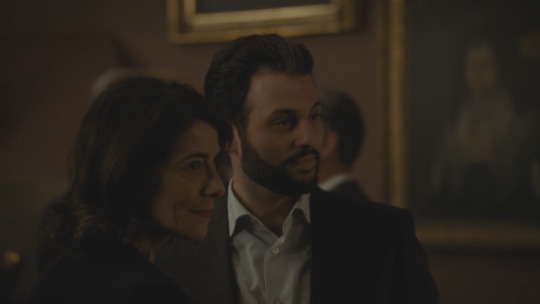
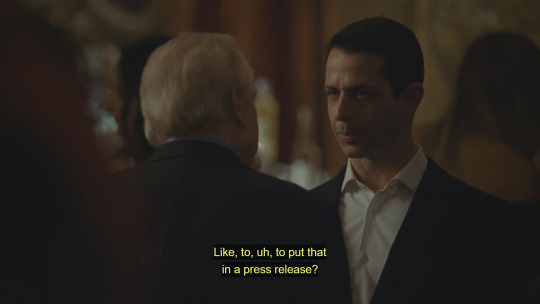
btw this is probably one of the most insane and telling scenes in regards to stewy nd kendall. like the stewy-marcia interaction first off. the way it’s so clearly paralleling kenstewy with logan and marcia. stewy and marcia literally watch their respective persons in silence. also important to note that stewy was one of the first ppl to greet logan when he arrived probably bc he knew that one of the first things logan was going to do was approach kendall and he wanted to get in there first to gauge the situation + logan. but stewy’s concern for kendall in regards to what could happen when he’s in close proximity to logan is so clear and almost synonymous with marcia’s own concern/love for logan at this point. like it seems intentional that they were shown to be like. logan and kendall’s respective partners here
#kenstewy#succession#stewy hosseini#stewy/marcia interaction just in general is insane. like she greeted him with such warmth. you can tell she genuinely fucking likes him.#like that’s soooooo . us brown ppl always win btw !#but also it’s like. the loganmarcia kenstewy parallels you could make…#marcia was the only one to completely understand and unequivocally love logan while knowing exactly who he was and what’s he done. and she#supported him stuck by him etc until he betrayed her#like he grew careless of her and took her for granted. and does that sound familiar? like that happened to my guys kendall and stewy. insane#ALSO throughout this scene you see stewy greet logan and marcia -> watch kendall talk to logan -> see him walking kind of fast in some#direction until caroline approaches him (and even then he doesn’t chat for long at all) -> then finally he finds kendall and sits down to#talk to him. like throughout this whole scene he’s just following kendall around😵💫 like it’s literally a party and he’s like. running after#kendall the whole time. and when he sits down he’s like. hey heard you talked to your dad lol. like he wasn’t 8 feet away watching kendall#intently stood next to marcia while it was happening. like that’s super insane#kind of unrelated but not really but stewy has the worst case of anxiety i’ve ever seen like he’s sooo anxious. he’s mentally ill fr and#i love him with all my heart#stewy#kennystewy#p
699 notes
·
View notes
Text
You know when you wanna desperately make new friends but the mortifying fear of being perceived by other people is too much to handle and what if I am actually just too shy for the rest of my life and nobody will ever know that under this timid and awkward exterior is a fucked up sweetie pie who just wants to share life experiences with people they care about

#I’m feeling things today#can you relate to this#can we make a support group#i am talking a lot#because i have so many thoughts and i feel like i’ve been in a dream the past couple months and finally the clouds are clearing a little bit#actually autistic#actually mentally ill#actually the hottest person on eart#party rock is in the house tonight#anyone wanna play genshin impact with me
184 notes
·
View notes
Text

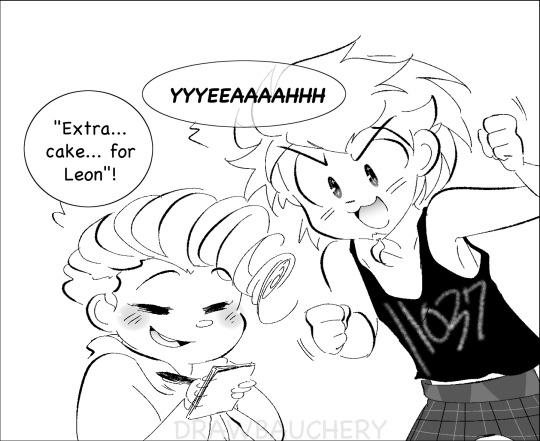
i got excited when i remembered they are friends in tdp
#chaotic-and-mentally-ill#art#danganronpa#bus au#teruteru hanamura#leon kuwata#and then i remembered what they have in common and eeuuughgh#they're really cute though#leon wanted cake from teru's class party#so teru made a lot more than planned#bc he knew akane would eat most of it#but he wanted to make sure there was some left over for leon#and no i do not keep track of all the friends my faves make#i DON'T do that
217 notes
·
View notes
Text
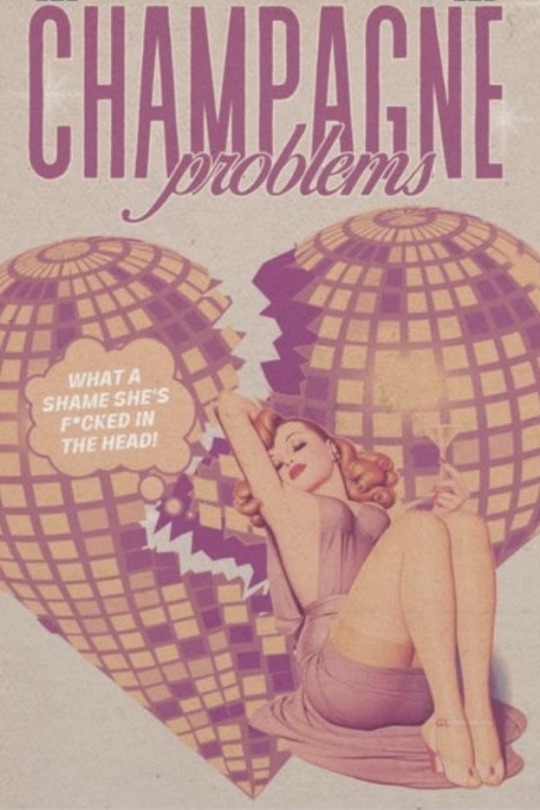
𝒄𝒉𝒂𝒎𝒑𝒂𝒈𝒏𝒆 𝒕𝒐𝒂𝒔𝒕 𝜗𝜚🥂
#roses and champagne#champagne toast#toast#party hard#fucked in the head#mentally fucked#mentally unstable#actually mentally ill#vintage poster#vintage love#vintage style#50s#girlcore#girlhood#hell is a teenage girl#girl aesthetic#girlblogging#tumblr girls#girl blogger#coquette#hollywood#for the girls#messy girl#girl interrupted#female rage#alcohol#champagnexowishes#pink champagne#rose wine#red wine
51 notes
·
View notes
Text
I like to think that Steve is fight in the sense of fight or flight, but if he's watching a horror movie he will screech like a little girl,
I also like to think that the Party are all horror movie fans, and Eddie and Robin are too. Steve is entirely against horror movies, but whenever they have movie nights it's like the only genre they all can agree on, so he just lets them get their way.
Eddie has always loved horror movies but his love for it went up ever since Steve started sitting next to him on the couch and grabbing his arm whenever he gets jump scared, cursing under his breath. Eddie puts an arm around him, his brain screaming at him.
#Steddie#Steve X Eddie#Stranger Things#st4#The Party#Steve Harrington#Eddie Munson#Robin Buckley#Stranger Things Hc#Steddie Hc#Steve is self sacrificial in the social way too#hes so babygirl#and mentally ill
367 notes
·
View notes
Text
tomorrow is my nineteenth birthday. i can’t believe i’ve lived this long, i didn’t expect to live past sixteen yet alone get to nineteen. this is a crazy thing to process, i still can’t buy anything i want to, still can’t rent a car, still can’t buy a hotel room, still can’t do literally anything but to me it’s still a milestone of how strong i am for continuing to live despite everything.
#actually bpd#bpd problems#bpd vent#actually borderline#actually mentally ill#bpd fp#bpd#bpd shitposting#bpd favorite person#bpd mood#this made me tear up a little bit just because i’ve been through so much and despite not wanting to exist.. having people acknowledge you#despite everything in your life that’s negative is a nice thing to go through#my fp and his sister want to do something small for my birthday and that makes me wanna cry#it was his sisters idea.. she loves me that much she’s willing to throw a mini party for me#dude i truly am so lucky to have him in my life.. he’s given me more strength and support than anyone has ever given me#his sister is so sweet too.. just gah im so in love with him
179 notes
·
View notes
Text
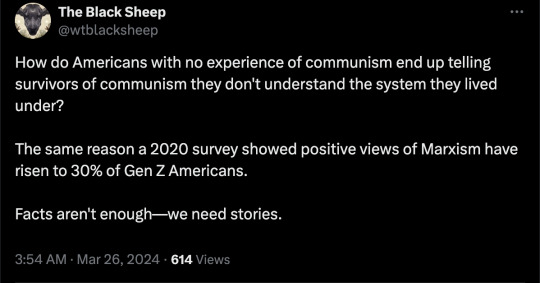
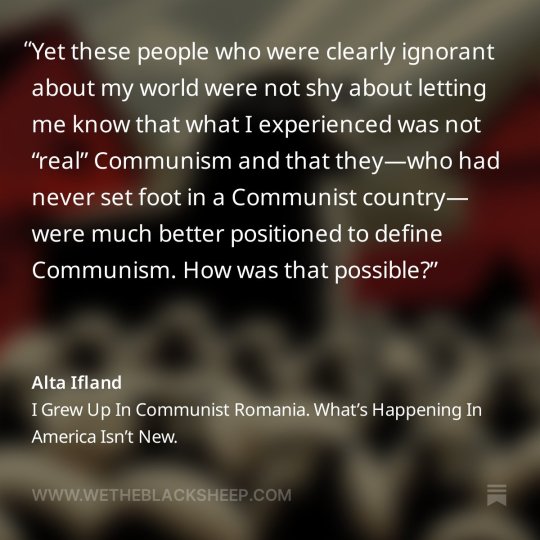
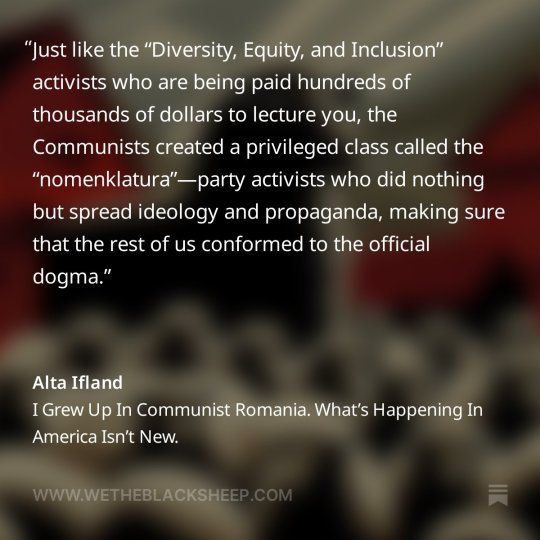

By: Alta Ifland
Published: Mar 25, 2024
Most of us have had at least once in a lifetime the experience of paradise when a place seems suddenly transfigured and elevated to an otherworldly realm. I experienced paradise in Iceland’s Reykjavik Airport in September 1991, where the plane that took me as a political refugee from Romania to the United States stopped for a couple of hours for a layover. It was the first time I had left my country of birth, and Reykjavik’s airport was my first contact with the West. I remember entering spaces that made me think of Aladdin’s cave of wonders, where under transparent glass lay mesmerizing diamond necklaces, and gorgeous saleswomen with seducing smiles inviting me to try them on; and I remember the impeccable marble-white restrooms like an alien spaceship with curious buttons I had no idea how to maneuver. Everything was clean, as if under the care of a doting fairy, and everybody smiled quietly as if life was a streak of uninterrupted joy.
I went back to Reykjavik for a literary conference twenty years later, but I could no longer find paradise. The diamond necklaces had no sparkle, Aladdin’s cave turned out to be a banal store, the women were like everywhere else, and the toilets nothing to write home about. The gap between the two experiences paralleled my first encounter with JFK Airport in New York, where—having to wait for my connecting flight to Jacksonville, Florida—I wandered for several hours among a hustle and bustle of people, stores, restaurants, buses and taxis, convinced that I was exploring the city itself. I mean, who in their right mind would imagine that they could find all of the above in an airport? It was only years later when I returned to New York that I realized that all I had seen of the city was, in fact, the airport.
These two primal encounters have left me with a lifelong love of airports, although life post-9/11 has considerably altered the experience. But the impression that our existence is made of two irreconcilable universes remained for a long time until, roughly, the advent of social media, which managed to unite the two into one indistinguishable blur and a chorus of mingled, screaming voices. Having spent my life between different worlds, I’m fascinated by the different frameworks people can place around the same events, according to the point of view given to them by their location in time and space.
As newly-arrived immigrants, my then-husband and I naturally gravitated toward other immigrants from Eastern Europe, and since they often went to church—which was, anyhow, the only socializing venue in Jacksonville (a city immortalized by Henry Miller in The Air-Conditioned Nightmare as a soul-killing locale)—we found ourselves for two years in the strange company of puritan evangelicals. After this edifying experience, my admission to an M.A. program at the University of Florida threw me into an environment that seemed completely opposite to the previous one, as if America were made of two separate worlds with two different types of people. Both types were a shock because they didn’t resemble the Americans I had known from the movies I’d seen—neither the neighbors who asked our Romanian friends to cover the non-existent breasts of their five-year-old daughter at the pool, nor my professors from the English department who joyfully professed their Communist and Marxist convictions to a roomful of sympathetic ears.
I cannot forget one professor who praised Mao’s “cultural revolution”—to this day I have no idea whether he was aware that millions had died as a result of this “revolution,” and that many Chinese in rural areas were so starved that they ate their own children.
It was clear to me that these academics knew nothing about the world I came from, which was, again, shocking, given that I knew a lot more about their world even though the country I grew up in was so isolated from the West that we used to refer to it as “outside.” I was the one who grew up in a prison, yet it was American academics who were the ignorant ones.
Growing up in Communist Romania, I read many American classics (the first book I read at eight years old was Mark Twain’s The Adventures of Tom Sawyer) and watched countless American movies. On the other hand, my American counterparts never read any books by Romanians (though I am not arrogant enough to demand that) or by Eastern Europeans generally, and rarely watched any European movies, let alone Eastern European movies. Yet these people who were clearly ignorant about my world were not shy about letting me know that what I experienced was not “real” Communism and that they—who had never set foot in a Communist country—were much better positioned to define Communism. How was that possible?
Let me tell you what nobody teaches Americans about the part of the world I come from.
--
For years, whenever I drove on one of America’s ten-lane highways, it felt impossible that this world existed in the same historical era as the world of my grandparents. I don’t have any photos of my paternal grandparents because in Communist Romania very few of us owned cameras. But they have remained etched in my mind in a way that makes them immortal, eternally old, as if their dark faces had always been crossed by deep ridges—the kind of faces only Indians (as we called them back then) had in black and white Hollywood movies, their feet always bare and so thick with calluses that when they washed them at night you could see the solidified dirt like mortar between brick-like layers of skin. They never used soap yet they had a drawer full of it, every single piece sent or brought by my father from the city. For them, soap was the equivalent of expensive jewelry, which Grandmother occasionally showed me, opening the drawer with pride: “See? Your father sent them. I keep them all.”
My grandparents lived in a world in which there was no money—I mean, there was no exchange of money, save for the rare occasions when Father gave them a few coins to buy bread. I remember walking with Grandfather unending kilometers through a sea of yellow corn until we reemerged in the world of the living, and Grandfather took out a handkerchief with a complicated knot that he untied to free the coins in exchange for the loaf of bread handed to him by the store clerk at the edge of the cornfield. But this type of exchange happened rarely. Usually, we ate hard polenta, the default everyday meal of Romanian peasants. We ate it either as a substitute for bread, which my grandparents usually couldn’t afford, or else as a meal immersed in a bowl of milk, one bowl for the entire table, inside of which our spoons often met, clanking.
My grandparents lived in the same way their ancestors had for generations in that part of the world: the province of Oltenia in Southern Romania. The only thing that had changed was that they were no longer periodically invaded by the Turks. The stove Grandmother used for cooking was like none other I’d seen except in films about remote indigenous populations—an oval-shaped structure of whitewashed clay set on the ground, with an opening through which one could glimpse the burning twigs, and atop, simmering pots full of aromatic dishes. In front of the stove, wearing her long Gypsy-like dress and stirring the pots, was seated Grandmother on a tiny chair, it too from a different world—about twenty inches high, with only three legs.
My grandparents’ village is where I spent my summers until I finished high school. During the school year, I lived with my parents in a small town in Transylvania in one of the countless intensely ugly Soviet-style flats. The grade school I went to was five minutes away on foot—since first grade, we all went on foot everywhere, unsupervised, and had the apartment key tied on a cord around our neck (apparently, today’s Romanians call us “the generation with the key by the neck”). Needless to say, we came back home on our own, warmed up the food prepared by our mothers, and were responsible for the supervision of our younger siblings until our parents came home from work.
My classmates were mostly children of factory workers and public office clerks; many of these parents had never finished high school and those with university diplomas were rare. Under Communism there was almost no middle class, and for a simple reason: the majority of people who had been part of it (university professors, politicians, economists, sociologists, priests, artists, writers, journalists, etc.) had been imprisoned, tortured and murdered.
Their guilt? They were all “enemies of the people,” the “people” being defined as dirt-poor peasants and what Marx called “the “proletariat.” Neither of my parents had college degrees. My father, whose parents were illiterate, never read a book; my mother, whose father was a chiabur (a farmer who paid for the sin of once owning land by spending a year in prison and having his eldest daughter refused admission to high school), used to read and over the years acquired a small library of Romanian, French, and English classics which I read dozens of times. After I finished reading our library, I began to explore the local libraries. With my best friend, whose parents were construction workers and morbid alcoholics, we took weekly trips to a library where the books were so yellowed and old they fell apart, and returned with a huge travel bag full of books. Without any guidance, we discovered many of the great classics: Sartre, Dostoevsky, Tolstoy, Cervantes, Gide, Flaubert, Zweig, Twain, Dickens—we read them all, entirely unaware that they were “great writers,” because no one had lectured us on their greatness. In our isolated world, we had a great advantage over children growing up in Western countries: we could discover the world with our own minds and in our own words.
When I say we had an “advantage,” don’t imagine that I'm glorifying the “system” in which we grew up. The world in which we were reading these books had the following characteristics: long lines to buy anything, major food items (sugar, oil, coffee, flour, butter) rationed and hard to find, hygiene products (soap, feminine products, toothpaste) entirely absent, winters without heat spent with our coats on inside our homes, electricity two hours a day, a single TV channel with most of its programs being delirious political propaganda, water cut off for days and sometimes weeks. In order to survive most city dwellers had to use the black market, where you could buy a pair of jeans for the cost of a monthly salary. For reference, my parents’ incomes combined totaled about eighty dollars per month.
In school we studied French. Without anyone’s exhortation and only the help of a dictionary, I soon began to read French classics for my own pleasure: Mérimée, Gide, Zola, Martin du Gard, Dumas, everything I could find. I was the best student in my grade in French, so I decided to major in it. In order to be admitted to college one needed to pass a very difficult exam in one’s specialty, and there were only about twenty positions for French students per university with just a handful of universities in the entire country. The majority of applicants able to pass the exam were either children of university professors or students from preparatory high schools. Given these circumstances, my teachers, neighbors, and parents all insisted that I should study engineering like everybody else and told me I was crazy to even consider French. Yet I persisted and passed the exam with the highest possible grade. While in college, during an internship where I worked as an assistant French teacher in a high school, I attended a class where the lead teacher introduced French food to the students, and after several minutes of hearing descriptions of baguettes, brie, camembert, and the like, one of them fainted. For us, this food was like fiction—not only had we never tasted it, we couldn’t even imagine that we would ever see it outside of a book. We were hungry and cold all the time, yet whenever we’d turn on the TV all we'd hear was that we lived in a “golden era”—the regime’s official language—for which we’d have to thank the Communist Party and its General Secretary, Comrade Nicolae Ceaușescu. All the country’s institutions held regular meetings where everybody, using a language of thought-terminating clichés which we called “wooden language,” had to massage the ego of the “Dear Leader” who made such an era possible. In this language, Ceaușescu was a “skilled helmsman,” a “beloved parent,” and “the exploitation of man by man” had been forever abolished.
During this "golden era” of Communism, when I was barely twenty-one, I got blacklisted as a “person very dangerous for the security of the state” because I had married a dissident. You see, in Communism, the entire family paid for the deeds of any of its members, including those of the dead ones. My husband’s main guilt was that he was the brother of a famous Romanian journalist who worked abroad for one of the Western radio stations that condemned the injustices of Communism. To understand why this was considered a crime, you need to know that the first thing Ceaușescu did every day was read a report on what had been said about him the previous day.
Since his fate was already sealed and he wasn’t even allowed to go to college, my husband and a few friends tried to create a political party that would have been an alternative to the only official one. Needless to say in a country where one in four citizens was an informant, they were quickly apprehended and subjected to harsh interrogations. This happened before my husband and I met; him being too traumatized to talk about it, I found out from his parents how he had been imprisoned and cruelly beaten. After we got married, he signed a petition demanding that the regime stop the demolition of villages and churches, a project Ceaușescu had started because he realized that the traditional rural lifestyle still gave people some independence. Consequently, Ceaușescu put us under 24-hour surveillance, with a car constantly parked in front of our building. We were young and foolish, and so we made fun of the unending series of spies who were struggling to remain inconspicuous every time we went out and they followed us. Sometimes we mocked them overtly, laughing out loud as we hopped on a bus, while they remained outside, but it was a dangerous game: you never knew when an “accident” could happen.
One afternoon, an individual in a black leather jacket got out of the car parked in front of our building while holding an envelope in his hand, entered for a few seconds, then returned with his hand empty. We didn’t keep the letter that my husband had retrieved from our mailbox because it made him so furious he tore it to pieces. The letter warned that “some people” might want to hurt me badly. The police summoned me a few days later to their headquarters for an undisclosed matter, with my husband forced to wait outside. Nothing horrible happened to me that day, save for the fact that I was asked to wait for several hours while my husband remained outside, not knowing when—or if—I was going to come out. When I was finally brought into an office, the officer informed me in a performatively worried tone that “some people” wanted to hurt me, and he wanted to make me aware of this danger.
This is how we lived for about two years until the anti-Communist Revolution from December 1989 swept the dictator and his clique away.
In the first week after the dictator was killed a member of the newly formed Front of the National Salute—the revolutionary organization that replaced the Communist Party and of which my husband was briefly a member—came to our home to uninstall a microphone that the Securitate (the Secret Police) had hidden behind our bed.
It took another quarter of a century until my husband was allowed to see the file the Secret Police had on us. It contained two thousand pages of content produced through the coordinated efforts of dozens of individuals and tens of thousands of dollars spent every month on our surveillance—in a country in which the average income was forty dollars. It also included the names of the “friends" who had informed on us—some of which we’d already guessed, others, a surprise. Our Secret Police file remained open until December 1991, that is, two years after the regime had fallen, and three months after we had left the country for America.
--
I left the building where my parents lived almost forty years ago, but when I last visited, some of the neighbors I had growing up were still there. Imagine passing by an old man who looks twenty years older than you, and then remembering that you had a crush on him when you were twelve and he was fourteen. The grey Soviet flats have remained unchanged, but in a certain way give you the reassuring feeling that time stands still and there's a continuity between generations—something absent in ever-changing American society.
While the memory of life in the small town of my childhood is ambivalently hazy, when I remember the rural world of my grandparents a wave of nostalgia washes over me. The three-legged wobbling chairs, the haystack above the cow barn where I used to read, even the short-lived doll made of rags that a friend from across the street had taught me how to make, ephemeral as she was, is now bathed in a golden aura of longing for a lost world.
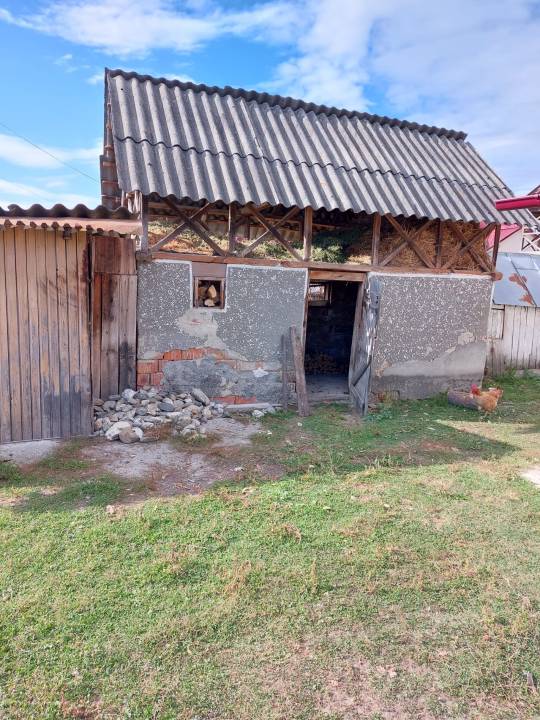
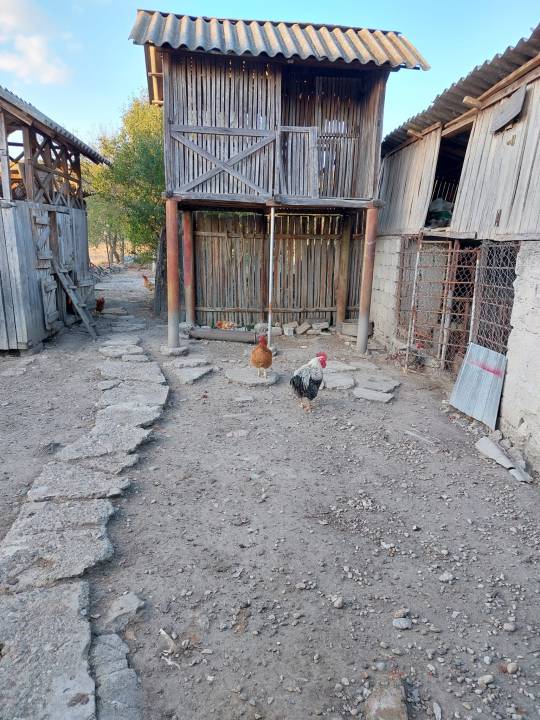
[ Photos of Alta's grandparent's home, taken during a recent visit to Romania. On the left is the cow barn where Alta used to read. ]
I sometimes look at the children of my American friends, with their room full of toys, and I know that their toys don’t make them any happier than my rag doll had made me. And I know that my American female friends, emancipated as they are from the “patriarchy,” aren’t happier than Grandmother. In all traditional societies, labor is organized according to the existence of the two sexes and this has nothing to do with anyone’s “oppression.” Men do some things, women do other things—it's simply a division of labor based on physical differences between the two, and it’s a division that can be observed across cultures and millennia. According to all statistics and their own statements, it’s obvious that many American women are in profound disharmony with themselves and the world in which they live. And this is certainly not because the world in which Grandmother lived was better—although I am wondering more and more whether it was much worse.
The first thing you need to be unhappy is to ask yourself whether you are happy or not—Unlike American women, I am convinced that this is a question Grandmother never asked herself.
Grandmother, just like her mother and her mother’s mother, lived in a way that imitated the lives of previous generations, in an entanglement with “tradition”—the dirty word that American feminists and progressives utter with so much disdain and which they translate as “oppression” and “victimization.” I often try to imagine what Grandmother would have answered had I told her that she was “oppressed” by the patriarchy in particular and society in general. I think she would have had a hard time understanding the concept. You see, it’s hard to feel “oppressed” when you have inner freedom. Aside from this, nobody in the world of my grandparents thought in these terms because in traditional societies it is shameful to be a victim. Only in a world of privilege can victimhood acquire a desirable status. I call this the law of subliminal contradiction, something I discovered by observing how Americans behave. Another example: only in a society of excess can the richest people dress in a way that imitates the homeless. In the society of poverty in which I grew up, it was shameful to wear torn-apart clothes; on the other hand, if you look at the way most well-to-do Americans are dressed today, you’d think they live on the street. Consider high fashion clothing that gives the illusion of poverty and manual labor, like mud-splashes and rips on jeans.
Today I write these lines from France, in my second exile. And many things have changed! My husband is now my ex-husband; he has returned to Romania, and I to Europe. My best friend with whom I used to explore libraries and books, and who grew up in a one-bedroom apartment with two parents, a grandmother, an older sister, and her daughter, and who at ten years old was forced by circumstances to take care of the entire household while her father lay drunk in a ditch and her mother worked on construction sites, is now a doctor and owner of a major medical lab. Unlike my American acquaintances, she never saw herself as a “victim” of anything. When I came to this country as a political refugee over thirty years ago, the thing that most impressed me about Americans was that they were very responsible and resilient. Thirty years later this country has been turned upside-down. But the truth is that the signs and the seeds of this reversal were already present thirty years ago, mostly in one particular space: academia.
The rare Marxists from back then are now the norm (although many traditional Marxists point out that, unlike American academics, Marx was never concerned with “race and gender”). They are the people who call Putin “right-wing,” as if he'd been schooled by the Republican Party rather than the Communist Party, whose Secret Police he represented as an officer of the KGB. The reason Putin is “right-wing” is because he’s a nationalist and anti-LGBT—but if these academics had read any books from my part of the world, they’d know that every single Communist country was ultra-nationalist and homophobic. In Communist Romania you could go to prison for twenty years for being a homosexual. Putin may no longer be a “Communist” because the gifts of the Capital are way too sweet, but his authoritarianism is rooted in Communism nonetheless, and his homophobia has nothing to do with being “right-wing” unless you project a Western value system onto a completely different world in which the categories of Left and Right merge.
After you’ve experienced the clichés of Communist propaganda, you can easily spot the mental structures underlying the impulse to reduce the complexity of the world down to one huge power struggle in which everybody is either an oppressor or a victim. This is why having lived through Communism has become very useful in contemporary America, and it's why the few of us who denounced the insanity of Communism when it could have cost our lives won’t keep our mouths shut now that America is losing its mind. For instance, the concept of “reparations” based on inherited collective guilt is eerily similar to the Communist practice of punishing an entire family for the deeds of any of its members, including the dead. Just like the “Diversity, Equity, and Inclusion” activists who are being paid hundreds of thousands of dollars to lecture you, the Communists created a privileged class called the “nomenklatura”—Party activists who did nothing but spread ideology and propaganda, making sure that the rest of us conformed to the official dogma. One trait of people who create dogmatic ideologies is that they never feel obligated to obey their own dogma—if they did, they would have to cancel their own privilege.
Because history is always written from one point of view, being an American academic often comes with the privilege of (re)writing history. And in an Americentric world, these academics look at everything through the lens of their own history, which they project onto everybody else. When have you ever heard academics from English departments and Women/Gender/Ethnic Studies—who have been teaching generations of students about the evils of European colonization—denounce the colonization of Eastern Europe by the Russians and by the Turks? It’s as if 500 years of history—the history of the Ottoman Empire—never existed. Or as if Russia started its colonial history with the invasion of Ukraine.
According to these academics, being European is equivalent to having a mysterious essence called “whiteness,” and I should repent for my “white privilege” and Europe’s colonial history, as if my “white” ancestors had colonized anyone and not the other way around, or as if they had enslaved “brown” Muslims and not the other way around.
Let me tell you an anecdote about how I was made to pay for my “white privilege.” You may remember the brouhaha after the poem performed by the young, black author, Amanda Gorman, at Biden’s inauguration, was commissioned to be translated into Dutch not by another black woman, but by a white person. This white person happened to be Marieke Lukas Rijneveld, who identifies as “non-binary” and is a few years older than Gorman. After a complaint that the chosen translator was not black, the translator withdrew from the project and the publisher issued a public apology—never mind that it was Gorman herself who had chosen the translator and that it’s quite likely that there aren’t many black translators who translate into Dutch and have Rijneveld’s literary skills. I know this because I had read Rijneveld’s award-winning book translated into English and recommended it on social media. When the scandal broke, many American translators—some of whom I was personally acquainted with through my work as a translator—commented on the affair online, supporting the decision to replace the white translator with a black translator. In response, I dared to share the comment of a French member of PEN, who believed that skin color should have nothing to do with who translates what. I accompanied this comment with my own: “I think that, this being a forum of translators, we should give a voice to different opinions from other languages.” I was subjected to a pile-on of virulent attacks, summoned to delete my “inflammatory” remarks, and it was made clear to me that my opinion could only be the result of my “white privilege” because I was (I'm not kidding you) a “cultural essentialist.” The cherry on top was that I was also called a “transphobe” because I had “misgendered” Rijneveld—the irony being that I was the only one in that group who had actually read and supported the “non-binary” author. I left these discussions after it was clear that I didn’t have the “revolutionary consciousness” to belong.
The fact is that nothing—and certainly not “white privilege” or any kind of “systemic” anything—is stopping anyone in America from learning languages and translating. When I was a graduate student in French at the University of Florida, my black classmate had spent time in France, just like everybody else in our program. I was the only one who had never been to France. Yet if I could learn French while believing that I would never see France because traveling to Western Europe was, for a Romanian of my station, as impossible as going to Mars, then any American—black, blue, or purple—can do it.
Privilege is a funny thing, especially in a society in which being a victim grants the highest social status. I for one prefer to assume the privilege of having experienced both Communism and life as an immigrant—a privilege America’s social justice warriors will never have—because it has taught me that you can be free under the worst dictatorship and a slave to groupthink in the freest of worlds.
==
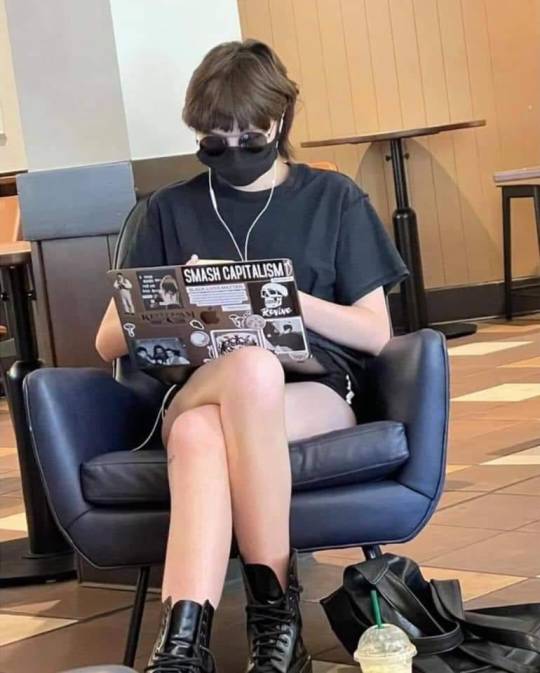
#SmashCapitalism
🤡
#Alta Ifland#We The Black Sheep#communism#capitalism#smash capitalism#Marxism#late stage Marxism#Communist Party#religion is a mental illness
19 notes
·
View notes
Text
Pity Party: a mini vent comic

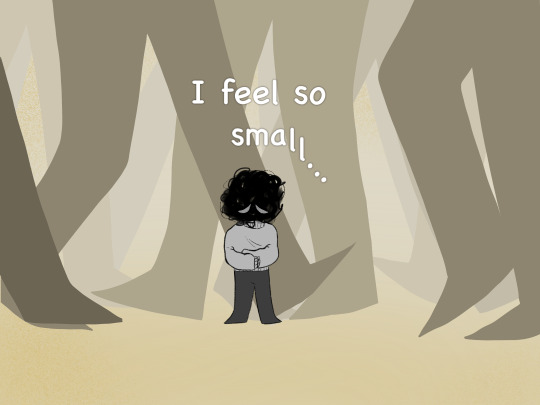
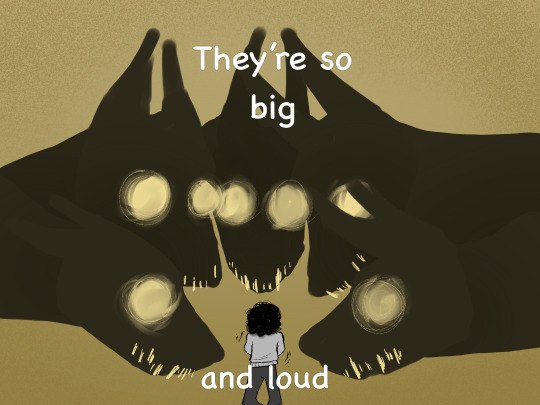
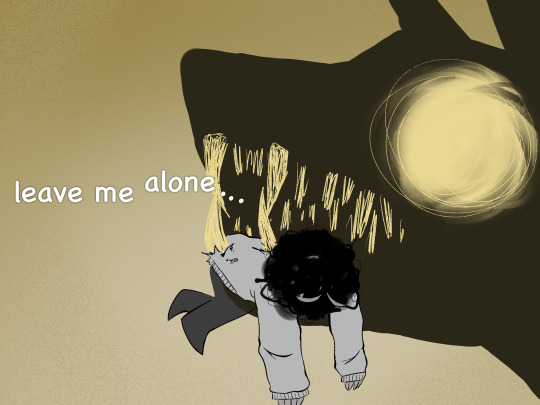




#Art#my art#vent#vent comic#vent art#internal dialogue externalized bitchesssss#Comic#mini comic#digital art#artists on tumblr#Have you ever made your therapist cry? I have lol#Pity party#My mentally Ill followers- you are seen and you are understoof#them gallery
71 notes
·
View notes
Text

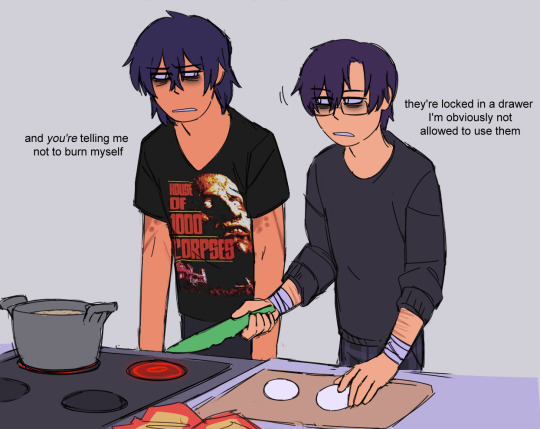
finding friends with the same mental disorder as you... priceless
#self harm implied#corpse party#kizashige#sorry when I think of them being mentally ill best friends it makes me feel crazy#I'm obsessed with the mundanity of them just bonding over their problems and not treating it like something dramatic or whatever#<- SICK IN THE HEAD#skdjhgjklgji*@($*&*(@)*$()@(*()$_
463 notes
·
View notes
Text
Neurodivergence and mental illness headcanons and analysis with the BG3 cast! All of them have trauma there's no way any of them are totally mentally well (NONE of them are mentally fully well, being an adventurer is traumatic in and of itself).
Shadowheart and Astarion both have Borderline Personality Disorder undoubtedly to me, with Shart also having an extra dose of anxiety and depression on top of that. Being kidnapped and raised in a cult and being held hostage by a vampire lord are more than traumatizing enough to cause that.
Astarion definitely has PTSD from his time with Cazador. Shadowheart, Halsin, and Durge (if the player plays as Dark Urge) definitely also have PTSD.
-My analysis for my Durge is for a different post because there is so much going on there, but know that OCD and BPD and PTSD are all strong contenders for their mental idiosyncrasies-
Gale most definitely has depression and likely comorbid Autism and ADHD.
Lae'Zel is very autistic-coded to me with her directness and perceived low empathy and struggle to understand faerunian customs - many alien type characters are autistic-coded by the nature of their 'fish out of water' character arcs. She also has anger issues galore, and trust issues, she was raised in a militaristic alien cult society there's no way she wouldn't have fucked up emotional development. She's direct and quick to anger, but I don't think she's outright Rude - others may Think she's being rude but she's not, she's being honest and saying what she thinks.
Karlach is Sooooo ADHD coded to me, she also has hella anger issues and I do not blame her one bit, as well as a moderate dose of anxiety. Someone give her a fireproof fidget toy I beg of thee.
Wyll hides his trauma and issues relatively well, but I would not say he's as well-adjusted as many assume him to be. He's self-sacrificing to the point of extreme detriment, possibly a people pleaser, I am certain he has anxiety and depression that he does his best to mask, and he may not have full blown PTSD but he definitely has trauma. I get the impression he has a low opinion of himself due to his pact and often can even be self-depreciating especially when made to look like a devil, definitely has signs of depression in him. He is such a precious man and I want to help him see that he's worth so much more than he thinks 🥺
Minthara, while I don't know her character as well as the others, definitely has trauma from being raised in the toxic cult of lolth-sworn drow society, greatly reduced empathy (but not non-existent) due to said cult society, is definitely a sadist, could have developed Antisocial Personality Disorder due to the way lolthite society molded her (Lolthite society raises people in a way to predispose them to having APD if you ask me, since it's built on manipulation and fear and ladder climbing on the backs of others). Despite possibly having APD due to the trauma of Lolthite society, Minthara is not incapable of love and devotion and can grow to care for tav and other party members over time, perhaps even to a fanatical level if you romance her.
Halsin has trauma that he often brushes off or downplays, he can be quite self-depreciating at times, and from my viewpoint he is hypersexual as a maladaptive coping mechanism. Definitely has self-image issues and doesn't see himself as worthy of the love and affection and positions of authority he's been placed in. Probably has depression that he works hard to mask in front of others.
Jaheira has a long history of trauma that include the events of the first two games, I would not be surprised if she has PTSD, but overall she is pretty well adjusted all things considered. She has trust issues but I don't blame her, she has justification.
Minsc is hilarious, that man has autism I am convinced, he has trauma but I'm not sure if he realizes his trauma is indeed trauma and not simply a mild inconvenience in his life. Either none of his trauma is processed as such in his brain so he is genuinely that happy-go-lucky, or that jovial attitude is a mask. Boo is...Boo. I do not know the inner machinations of a miniature giant space hamster.
If anyone in the game is a Narcissist, it's Orin the Red (NPD does not make one inherently abusive or evil of course, no personality disorder or mental illness makes anyone inherently bad, Orin just happens to embody many of its traits to the extreme and has the traumatic upbringing to cause it). Her story is so tragic to me, she wants so badly for Bhaal to love her, she wants the admiration and affection of the god of murder so bad and she doesn't care if that means killing the entire world. She's incredibly tragic, she doesn't realize she's as traumatized as she is because it got channeled into her mask of self-importance and lack of empathy extreme sadism and want for admiration from Bhaal specifically. If it was possible to if not redeem her, at least spare her from death and break her out of her cult mindset, I would do it in a heartbeat. I love Orin as a character so much.
Gortash could be APD, but I think he fits Obsessive-Compulsive Personality Disorder more. His want for control, for order, under the tyranny of Bane, to wrench control and revenge for the childhood he was robbed of, it's very fitting. He's distrustful and known for deceit but his ride or dieness with Durge and willingness to Risk It All for Tav is endearing to me, and could be him manipulating or simply be that he does in fact see teaming up with Tav as the best course of action for him to maintain his control. I'm biased I know, I like Gortash too much.
Ketheric is spiteful and traumatized from the death of his wife and daughter and the cult he imbedded himself in yes, but he takes it to an extreme in his lashing out from his grief. I don't think he's antisocial or narcissistic, I mainly think he's depressed and a victim of a sunk-cost fallacy taken way too far. He committed to the bit until the very end.
If anyone else could possibly have APD or NPD, I think it'd be the Emperor, but I also feel the mental quirks of being a mindflayer predispose someone to being manipulative and self-agrandizing. He is a Very sly and effective manipulator, and even though overall he has the common goal as the player and protects them from death and transforming into a mind flayer for the majority of the game, he is ultimately doing it for his own aims. He hid the truth of Orpheus and his own form for most of the game, because he was so distrustful of Tav that he believed they would never trust him otherwise - which he can't actually know as true or not. Unfortunately for him I chose saving Orpheus and helping Lae'Zel over helping him because his history of manipulation and omition of information caught up to him and caused the very distrust he wanted to avoid. He is a great morally grey/dubious character who can be both loved and loathed for his antics.
Dame Aylin and Isobel definitely have trauma if not PTSD, and Aylin probably is autistic.
Listen what I'm saying is autistic people have a surprisingly high level of charisma and they and other neurospicy people congregate together to make some delicious neurospicy food.
Those are all the characters I have thoughts about for the moment, and these are my headcanons more than anything, so don't take this too seriously.
#bg3#baldur's gate 3#bg3 spoilers#razzberry rambles#razz rambles#character analysis#mental illness#headcanons#razz headcanons#listen it is way too easy for me to read every damn party member as having bpd they're all traumatized it's par for the course#neurospicy
27 notes
·
View notes
Text

"Da Only Tea Party I'd Join.. Is Da Boston Tea Party!"
18 notes
·
View notes
Text
Currently thinking about Morgan saying the reason she likes Glenn more then Jodie is because even though he's really stupid, he is trying and thats why she loves him but it's "this is the best its going to be" when it comes to his relationship to Nicky.
Thinking about how Morgan was someone who pushed back against Glenn's worse behaviors and called him out. Morgan made Glenn want to be better. And then she died and Glenn gave up trying because Nick wasn't a good enough reason to keep on trying
#glenn is terrible❤#he is the absolute worst guy#obsessed with the idea of being with nick again was the only thing to keep glenn going in prison#and then he gets out and is given the opportunity to be in nicky's life again#the opportunity to do it over and this time actually be there#and he just#doesn't want to#its too hard. why would he need to hang out with the kid who came from a unplanned pregnancy when he could run off with his wife and party#as someone with a mentally ill parent who was my codependent bestfriend and watching her refuse to change or be there for me anymore#nicky never being worth it or good enough for his dad just hits a lot harder#freddie owes me emotional damage compensation#dungeons and daddies#dungeons and daddies s2#dnddads s2 spoilers#glenn close#nick close
26 notes
·
View notes
Text

Sunny mornings and messy kitchens
#teaching your boyfriend how to cook#because she doesn’t let you too close to the stove#mental illness runs rampant in these two#drawing this was like playing with dolls#it took way too long#I could only do it in small bursts#kizashige#corpse party#yuuya kizami#sakutaro morishige#copa#cw s/h#s/h scars#etchings
34 notes
·
View notes
Text
Reason to Live #8769
Petting dogs at people’s parties. – Guest Submission
(Please don't add negative comments to these posts.)
#sad#help#hope#reason to live#depressed#depression#empty#alone#mental illness#anxiety#trauma#guest submission#mental health#petting#pets#pet#dogs#dog#party#parties#party dog
71 notes
·
View notes
Note
Wait are we making blts down? Do you mind if I bring cupcakes?
hell NO bring a ton of that shit
29 notes
·
View notes